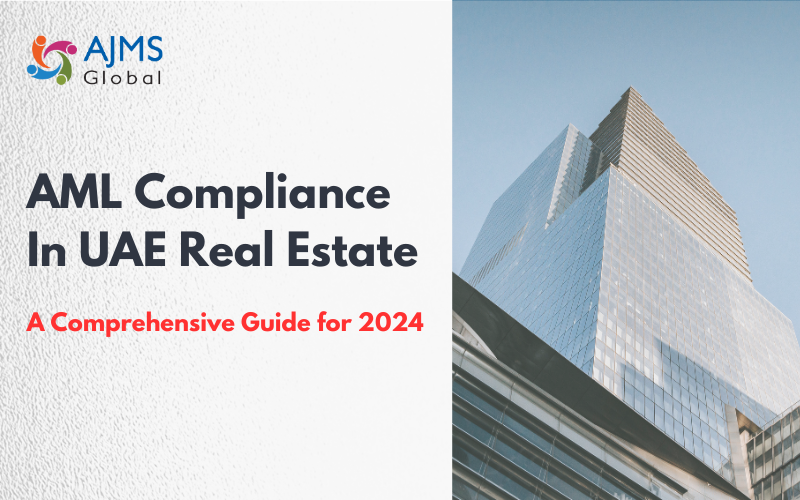In the financial world, anti-money laundering (AML) compliance is essential, particularly in sectors like real estate where big financial transactions possess a high risk of being used for illegal objectives. One of the most dynamic industries in the United Arab Emirates (UAE) is the real estate sector, but it also has vulnerabilities related to money laundering.
To protect its real estate market, draw in reputable foreign investors, and uphold its standing as a major global financial center, the UAE has placed strict anti-money laundering (AML) regulations into place. This blog will offer an extensive summary of AML compliance for real estate in the United Arab Emirates, including legal requirements, significant obstacles, and recommended procedures for 2024.
Table of Contents
ToggleIntroduction to AML Compliance in UAE Real Estate
The UAE real estate industry is under growing pressure to comply with anti-money laundering (AML) standards as international banking regulations become more stringent. Illicit funds are incorporated into the financial system, frequently through expensive transactions like real estate purchases, which leads to money laundering. The UAE government has responded to this by enacting stringent AML regulations that guarantee real estate firms, brokers, and agents adhere to global norms.
The Financial Action Task Force (FATF) assessed the UAE in 2019 and emphasized the significance of stepping up anti-money laundering measures. Since then, in order to improve supervision in the real estate sector, UAE authorities have dramatically reinforced its AML framework.
Understanding AML Regulations in UAE Real Estate
The extensive AML laws in the UAE are applicable to all real estate professionals, including brokers, developers, and agents. In the UAE real estate industry, AML Compliance is shaped by a number of important rules and regulations:
2018’s Federal Decree-Law No. 20: This law establishes the framework for all industries, including real estate, to combat money laundering and the funding of terrorism (CFT). Real estate brokers and other designated non-financial companies and professions (DNFBPs) are required to adhere to stringent AML regulations.
Cabinet Decision No. 10 of 2019: This ruling specifies the requirements for compliance, including customer due diligence and reporting suspicious transactions, and clarifies how AML regulations should be applied.
The GoAML System: Real estate professionals can notify of suspicious activity on this online platform, which is run by the Financial Intelligence Unit (FIU) of the United Arab Emirates. It is mandatory for all brokers and agents in the real estate industry to register and submit reports using this system.
Supervisory bodies enforcing these laws include the Ministry of Economy, which keeps an eye on real estate companies to make sure they’re complying.
Why UAE Real Estate is Targeted for Money Laundering
Due to its profitable growth, tax advantages, and reputation as a major worldwide commercial hub, the UAE real estate market is very appealing to foreign investors. Nonetheless, it is susceptible to money laundering operations due to these same causes. Principal causes are as follows:
High Transaction Values: Since real estate transactions frequently include substantial quantities of money, they give criminals the chance to launder a sizable quantity of money in a single transaction.
Use of Shell Companies: It might be more difficult to track down illicit payments when the identities of the real property owners are concealed by offshore corporations or trusts.
Cross-border Investments: Because money may come from countries with laxer AML laws, the UAE’s significant attraction to overseas investors makes transaction monitoring more difficult.
Historically Cash-intensive Sector: Despite regulations from the UAE regarding cash payments in real estate, the sector has historically relied heavily on cash, which has left it open to money laundering schemes.
AML Obligations for Real Estate Professionals in the UAE
AML compliance for real estate professionals in the United Arab Emirates entails fulfilling many crucial obligations:
Customer Due Diligence (CDD): Real estate brokers are required to confirm the legitimacy of their clients and evaluate the possibility of money laundering. This entails finding out where the customer gets their money from and checking up on any beneficial owners hiding behind legal corporations.
Know Your Customer (KYC): Real estate firms need to carry out comprehensive KYC processes to identify their clientele, particularly those deemed high-risk, like non-resident buyers and politically exposed persons (PEPs).
Suspicious Transaction Reporting (STR): Real estate professionals are required to report any transaction that seems suspicious or doesn’t seem to have a clear economic motive to the FIU using the GoAML system.
Record-Keeping: Real estate companies must keep thorough records of all transactions, customer identification, and correspondence for a minimum of five years in accordance with AML requirements.
Risk-Based Strategy: Real estate firms must adopt a strategy to AML compliance that is based on risk. For clients that pose a greater risk, this entails classifying and evaluating them according to their risk profile and using enhanced due diligence (EDD).
Common Challenges in Meeting AML Compliance
Real estate agents in the United Arab Emirates have many obstacles in upholding AML compliance, even with the legislation being rather detailed.
Complex Ownership arrangements: It can be challenging to determine the beneficial owners of complex corporate arrangements, particularly when working with offshore firms.
Changing Regulations: Smaller real estate companies may find it difficult to keep up with the latest rules and regulations due to the regulatory landscape’s continual change.
Technology Gaps: Due diligence and reporting for many real estate enterprises are still done manually, which raises the possibility of human mistake and non-compliance.
Cultural hurdles: Due to the diversity of investors in the United Arab Emirates, compliance efforts may be complicated by linguistic and cultural hurdles that make it difficult to grasp AML regulations.
Best Practices for AML Compliance in UAE Real Estate
To mitigate the risk of money laundering, real estate professionals in the UAE should implement best practices for AML compliance:
- Leverage Advanced Technology: Invest in AML software that automates due diligence and KYC processes. Machine learning and artificial intelligence (AI) have the potential to identify suspicious activities and lower human mistake rates.
- Provide Regular Staff Training: Make certain that all staff members, from compliance officials to frontline agents, receive training on the most recent AML laws and indicators of risk.
- Undertake Enhanced Due Diligence (EDD): To further evaluate possible risks, undertake EDD for high-risk customers, particularly non-resident investors and those utilizing complicated business structures.
- Hire an AML Consultant: As AML consultants specialize in detecting risks and often use more sophisticated systems, hiring a consultant like AJMS Global for you real estate business can prove beneficial.
- Conduct Internal Audits: To validate compliance and reveal possibilities for development, conduct routine internal audits of your AML procedures.
Future Trends in AML Compliance for the UAE Real Estate Market
A greater dependence on digital solutions is expected for AML compliance in UAE real estate in the future as technology and legal frameworks advance. Real estate professionals will find it simpler to monitor and report suspicious behaviors in real-time with the use of AI-driven compliance solutions, while blockchain technology may offer more transparent and secure real estate transactions.
Global regulatory requirements, such as those imposed by organizations like the FATF, will also propel more advancements in beneficial ownership disclosure and transparency. These patterns suggest that AML compliance will become increasingly automated, simplified, and technologically driven in the future.
Conclusion: The Importance of AML Compliance in 2024
To preserve its integrity and safeguard its standing as one of the top international investment destinations, the UAE real estate market must adhere to AML regulations. Real estate professionals need to make sure they are completely complying with AML rules because of the stringent regulations in place. They may accomplish this by using technology, taking a risk-based strategy, and regularly performing due diligence.
For real estate enterprises hoping to thrive in this fiercely competitive market in 2024, maintaining ahead of AML compliance regulations will be essential as the UAE continues to solidify its position on the global scene.
Need Help Navigating AML Compliance?
Ensuring full compliance with AML regulations can be challenging, but you don’t have to do it alone. AJMS Global is a leading consultancy specializing in AML and Regulatory Compliance. With our expert team and deep understanding of UAE real estate regulations, we can help you implement the right strategies to protect your business and meet all AML requirements.

